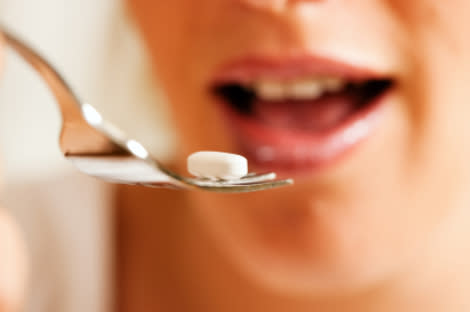Essential Vitamins for Women
Written By Mandy Seay For QuickEasyfit

A lot of women rely solely on their diet to provide all the nutrients that their body needs. Although maintaining a regular diet consisting mainly of healthy foods can help, it may not be sufficient to obtain a completely nourished body just from the diet alone. Especially in today's fast-paced world, poor eating habits are easily developed and picked up. Complementing the regular diet with vitamins for women can help make up for the nutritional deficiencies and ensure better overall health.
Read Also - Foods for a Healthy Heart: Do You Know These 7?
Although all women require specific types of vitamins and minerals, the intake of additional dietary supplements may be required for women of child-bearing age. Following are the most essential nutrients that women need for complete nutrition which they can get from multivitamins:
Calcium - This nutrient is important for bone mass development especially during the individual's early years. Calcium helps to reduce the risk of getting osteoporosis, a bone disorder characterized by a deterioration of the bone density. For women under 24 years of age, daily intake of 1200 mg of calcium is highly recommended. Upon reaching the age of 25, it is generally considered safe to lower the calcium consumption by 1/3 or to bring it down to 800 mg daily.
Iron - Women naturally lose some amounts of iron on a monthly basis through the regular menstrual cycle. To make up for the loss, an intake of 15 mg of iron every day is ideal. This will help women prevent the occurrence of anemia arising from iron deficiency. Anemia is a disorder that causes headaches, fatigue, and paleness. Intake of foods that are known rich sources of iron like spinach, beans, peas, meat, and fish will help as well as dietary supplements containing iron. As excessive consumption of iron can pose some health hazards, women should first seek the advice of a medical professional prior to ingesting iron supplements that exceed the recommended 15 mg each day. ( Top 5 Things That Ruin Your Dieting Plan )
Folic Acid - For women in the child-bearing age group, daily intake of food supplements containing 400mcg of folate or folic acid every day is recommended. This will help in the prevention of neural tube birth defects such as anencephaly and spina bifida. As the development of the neural tube occurs during the early phases of pregnancy, it is crucial for women to take this type of dietary supplement even prior to the discovery of their pregnancy. This will significantly reduce the risk for such birth defects, if and when.
Vitamin D - According to results of various studies made, vitamins for women, specifically Vitamin D can help provide women with protection from breast and colon cancer. There are also studies that tend to show that supplementing the diet with the right doses of Vitamin D can help enhance the body's natural immune system and prevents the onset of common diseases such as flu and colds. Vitamin D is also known for its ability to regulate and control the calcium levels within the body. For women, the consumption of at least 400 IU of this type of vitamin on a daily basis is ideal. Dark-skinned and obese women, however, should first consult a doctor if the intention is to take an amount of Vitamin D that exceeds the recommended dosage.
Read Also - 5 Top Contemporary Cocktails Trends
Certain amounts of Vitamin D can likewise be obtained from natural sources. These sources include dairy products (like eggs and milk) and exposure to sunlight. Vitamin D3 food supplements also contain some Vitamin D.
Vitamin C - This is an antioxidant that is beneficial in the prevention of various types of cancer, cataract, hypertension, stroke, coronary heart disease, and other heart diseases. Deficiency in Vitamin C can result to a disorder known as rickets which causes bruising, bleeding, tooth loss, pain in the joints, and hair loss or baldness.
Normally, women are advised to have a daily Vitamin C intake of 10 mg each day. However, smokers would require more, or about 110 mg on a daily basis. Citrus fruits, strawberries, broccoli, and red peppers are some of the better Vitamin C dietary sources. Vitamins for women, specifically Vitamin C dietary supplements, either in the organic or synthetic form are also available.
The need for supplementary vitamins for women is never more evident as it is today because of the advent of advanced technology that promotes busier lifestyles. This results to a heavier reliance on fastfood restaurants for primary nutrition. This practice obviously cannot be expected to provide the active and busy woman with the complete nutrition she needs to get her through the entire day. Dietary supplements can help make up for the deficiency.
Read More From QuickEasyfit
7 Unnecessary Tests and Medical Care to Avoid
9 Steps to Healthy Grocery Shopping

